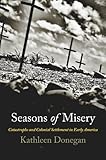Seasons of Misery : Catastrophe and Colonial Settlement in Early America / Kathleen Donegan.
Material type: TextSeries: Early American StudiesPublisher: Philadelphia : University of Pennsylvania Press, [2013]Copyright date: ©2014Description: 1 online resource (272 p.) : 2 illusContent type:
TextSeries: Early American StudiesPublisher: Philadelphia : University of Pennsylvania Press, [2013]Copyright date: ©2014Description: 1 online resource (272 p.) : 2 illusContent type: - 9780812245400
- 9780812209143
- 973 23
- E162 .D66 2014eb
- online - DeGruyter
- Issued also in print.
| Item type | Current library | Call number | URL | Status | Notes | Barcode | |
|---|---|---|---|---|---|---|---|
 eBook
eBook
|
Biblioteca "Angelicum" Pont. Univ. S.Tommaso d'Aquino Nuvola online | online - DeGruyter (Browse shelf(Opens below)) | Online access | Not for loan (Accesso limitato) | Accesso per gli utenti autorizzati / Access for authorized users | (dgr)9780812209143 |
Browsing Biblioteca "Angelicum" Pont. Univ. S.Tommaso d'Aquino shelves, Shelving location: Nuvola online Close shelf browser (Hides shelf browser)

|

|

|

|

|

|

|
||
| online - DeGruyter The Traveler, the Tower, and the Worm : The Reader as Metaphor / | online - DeGruyter The Life of Benjamin Franklin. Volume 1, The Life of Benjamin Franklin, Volume 1 ; Journalist, 176-173 / | online - DeGruyter Getting a PhD in Economics / | online - DeGruyter Seasons of Misery : Catastrophe and Colonial Settlement in Early America / | online - DeGruyter The Sports Franchise Game : Cities in Pursuit of Sports Franchises, Events, Stadiums, and Arenas / | online - DeGruyter Slavery in Medieval and Early Modern Iberia / | online - DeGruyter Toronto : Transformations in a City and Its Region / |
Frontmatter -- Contents -- Introduction: Unsettlement -- Chapter 1. Roanoke: Left in Virginia -- Chapter 2. Jamestown: Things That Seemed Incredible -- Chapter 3. Plymouth: Scarce Able to Bury Their Dead -- Chapter 4. Barbados: Wild Extravagance -- Afterword: Standing Half-Amazed -- Notes -- Index -- Acknowledgments
restricted access online access with authorization star
http://purl.org/coar/access_right/c_16ec
The stories we tell of American beginnings typically emphasize colonial triumph in the face of adversity. But the early years of English settlement in America were characterized by catastrophe: starvation, disease, extreme violence, ruinous ignorance, and serial abandonment. Seasons of Misery offers a provocative reexamination of the British colonies' chaotic and profoundly unstable beginnings, placing crisis-both experiential and existential-at the center of the story. At the outposts of a fledgling empire and disconnected from the social order of their home society, English settlers were both physically and psychologically estranged from their European identities. They could not control, or often even survive, the world they had intended to possess. According to Kathleen Donegan, it was in this cauldron of uncertainty that colonial identity was formed.Studying the English settlements at Roanoke, Jamestown, Plymouth, and Barbados, Donegan argues that catastrophe marked the threshold between an old European identity and a new colonial identity, a state of instability in which only fragments of Englishness could survive amid the upheavals of the New World. This constant state of crisis also produced the first distinctively colonial literature as settlers attempted to process events that they could neither fully absorb nor understand. Bringing a critical eye to settlers' first-person accounts, Donegan applies a unique combination of narrative history and literary analysis to trace how settlers used a language of catastrophe to describe unprecedented circumstances, witness unrecognizable selves, and report unaccountable events. Seasons of Misery addresses both the stories that colonists told about themselves and the stories that we have constructed in hindsight about them. In doing so, it offers a new account of the meaning of settlement history and the creation of colonial identity.
Issued also in print.
Mode of access: Internet via World Wide Web.
In English.
Description based on online resource; title from PDF title page (publisher's Web site, viewed 30. Aug 2021)


